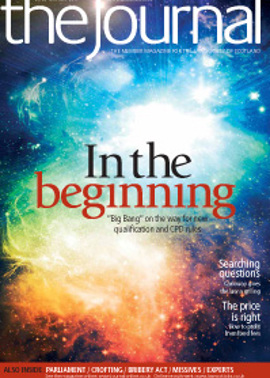Public ethos

Alternative business structures? Legal aid? The Society’s dual role? Or just the intricacies of constitutional reform? Whatever the issue, or issues, each new presidential term at the Law Society of Scotland these days seems to bring its share of controversies to threaten schism within the Scottish solicitor profession.
Yet when all is said and done, the majority of the Society’s 10,500 or so members still have as little to do with their professional body as possible. None of last year’s highly charged general meetings and referenda achieved more than a 40% turnout. And Cameron Ritchie, who takes over the hot seat at the end of May, has it as one of his goals as President to encourage solicitors to take more of an interest in their professional body’s work.
“If you ask people face to face, there is a mixture of things”, he says. “They are largely content with what the Society does on their behalf, or unfortunately they see the Society as a background support that doesn’t have a great deal of day-to-day impact on their lives. It’s the latter group that concern me because even at our best we still have about 60% of the profession who are not engaged on an active basis in anything that we do.”
Time to move on
You might think that the Society has enough to do with the ones who do engage. The divisions caused by the big issues of recent times are very real. Would it be fair to say that following the recent row over legal aid and the Society’s role in where the cuts fell, they have become deeper than ever?
Ritchie does not accept that that represents the broader picture, believing for instance that the Society is once again coming to work more closely with the Scottish Law Agents Society, which led the opposition to the ABS reforms in the Legal Services (Scotland) Act. “It’s quite clear to me that SLAS for example are now reconciled to the fact that the 2010 Act is in place. We had a lengthy and at times robust debate about whether it should be passed, but now we’ve reached the stage where it has, they’ve accepted that. There are still strong differences of opinion, but we see signs of them being prepared to work closely with us to take things forward.”
At time of writing the Society is in talks with SLAS and others to seek agreement on a way forward for constitutional change, following the failure to achieve sufficient support for the scheme before the AGM – a project in which Ritchie has been involved since its inception. With senior counsel having since advised that the weakness of the current constitution in relation to the 2010 Act is basically the inability to appoint non-lawyers as full members of Council, does he still believe that adoption of a whole new scheme is the better way forward?
“We started out on this before the 2010 Act was even envisaged, or at least its details. The changes in the constitution are an attempt to bring the rules of governance, the Society’s role, its management as an organisation up to date, and make them more modern and capable of working. The Act of course provides us with a situation where certain things need to change, but I really want to stress that that is not what the whole project is about.”
Voices being heard
Talk of the constitution leads on to the Society’s functions, and the arguments over its dual role. Not a new issue, of course, and one answered quite firmly in favour of the status quo, in the referendum requisitioned last year. Ritchie points out that the Solicitors (Scotland) Act does not actually use the terms representation and regulation. “The Act requires the Society to act ‘in the interests of’ the profession, and the public in relation to the profession. How can you disentangle those interests? I would say that as a profession you have to have regard to the public interest.”
He regards as absurd the idea that the Government would be willing to negotiate on matters such as legal aid with different groups from around the country, if solicitors individually were free to choose their representative body; and points out that organisations such as SLAS and the Glasgow Bar Association “often give evidence to the Justice Committee for example, and stress their own opinions, and these opinions I believe are listened to”.
It is on that legal aid issue that he admits the divisions still run deep, especially with Glasgow members since the row over stipendiary court fees. “One thing that has surprised me has been the degree of personal enmity in some comments I have seen. At one GBA meeting I went to, they had issued a paper beforehand which included comments on my role that made me sound like some kind of government spy!” The irony is that he hasn’t even been involved in those negotiations, not having dealt with legal aid in his career as a fiscal. He adds however that when he meets solicitors, GBA or otherwise, as individuals, reactions have been more positive.
Strategy matters
His time as Vice President has taught Ritchie not to be too grandiose about the Society’s ambitions for the year ahead. “Twelve months ago I might have given you a very grand plan for the future. I’m afraid a year of reality has drawn me back a wee bit and some of our priorities are genuinely quite short term priorities. One is, we need to get changes in to implement the 2010 Act and then move on to the issue of becoming an approved regulator and what that requires.”
Going to press ahead of the election, future timing remains uncertain, though Ritchie believes it likely that the legislation will be in force within the year. “Given that the Act was passed unanimously I think it would be quite difficult for whoever is the Government not to move forward and put the rules in place. But we’re ready; we’re anticipating what will be in the regulations; we’re writing our rules, our framework; we very quickly could put an application together to be a regulator and put the necessary framework in place to move forward.”
But the Society is thinking longer term as well, with work in hand on a five to 10 year strategic plan. What is the vision driving that? “We want to be the regulator of choice for business entities that carry out legal services, that’s a strategic vision, and what we have to do then is work within that to provide the sort of framework which would not only allow us to be a regulator but would attract legal services providers to come to us rather than somewhere else.”
The work would also try and anticipate such things as IT developments, or the state of the economy: “Some of it’s beyond the horizon: we could get it wrong, but it’s still this question of just anticipating what’s going to happen, both short and medium term, and being prepared for it.”
He adds: “I think we’ve been in the habit for too long of reacting to things after they’ve happened. The profession’s been very bad at that, tending to wake up after something’s happened. That might have been the tradition but it’s something we want to get away from, to be ready well in advance for anything that goes on and be prepared to move forward.”
On recent experience, events within the profession have been as hard to predict as any, but Ritchie would like to improve the Society’s ability to anticipate problems in its own backyard, and to respond. That applies equally to things that will lead to good press, such as the Holyrood manifesto with its call for better public education in matters legal, which was given a lot of coverage.
Governing the governor
The practice has been growing recently of candidates for office preparing a personal manifesto. Ritchie did not, and is quite glad of it given the rapid turns of events of the past year. He does however have a clear idea that his public sector experience can offer something different, particularly in working with chief executive Lorna Jack in taking forward the changes to the Society’s governance.
“This is a large organisation with a substantial budget. My background latterly was as head of an area procurator fiscal’s office that had a similar sort of budget and staff, albeit doing a completely different legal function.
“Externally as well, I find I’m able to bring a different perspective to the way we deal with people. I think it’s been very useful in the Cadder case discussions to be able to make the point, when we are presenting our views to Government, that not everybody in the Society is a defence solicitor, that it contains prosecutors as well as the defence side and we have higher level objectives.”
Conscious of the face that it presents to the public and politicians, the Society is trying to get away from “the image of rather a stuffy little club for a limited number of legal practitioners”, and to become “a much broader and wider organisation that reflects the diversity of the whole profession”. This, Ritchie believes, has been helped by the recent succession of office bearers which has seen the three roles shared between in-house, small firm and large firm solicitors.
At the end of the day, Ritchie recognises that his term of office isn’t so much a case of seeking to achieve certain things within a 12 month period, as working with the other office bearers during his three years at that level, to move the Society forward – and also the wider profession. “That might sound slightly patronising, given there are some very large firms out there with thoroughly modern practices, and I don’t want to insult them. But the profession as a whole is still seen by the public as being a wee bit antiquated and a bit conservative with a small c. It would be good to try and get over the view that it’s a modern profession that wants to be involved in the whole civic life and business of Scotland and has a great deal to contribute to people.”
CAMERON RITCHIE FACTFILE
- Born and brought up in Paisley; educated at the John Neilson Institution and Glasgow University, from where he graduated in 1972.
- Apprenticed at Wright & Crawford, Paisley, then joined the Procurator Fiscal Service, as it was then called.
- Posted successively to Ayr, Glasgow, Hamilton, Dundee, Stirling – and Fife, where he became area procurator fiscal. Also admitted as solicitor advocate.
- Married with two adult children, he lists his interests as walking, golf and watching rugby – which he used to play but is still suffering from the effects.
In this issue
- Experience not to be missed
- Call in the experts
- Planning to deliver
- Stars of the future
- Registered Paralegal Scheme hits the mark
- CPD: a personal quest
- Wha's like us?
- Holyrood: a verdict
- Public ethos
- Power in name only?
- From the Brussels office
- Minority voices
- Law reform update
- Quinn Direct - when to intimate?
- Name your price
- Ask Ash
- Communication breakdown - a major risk issue
- Interested parties
- Support from afar
- Plus ça change?
- Where the state has to stop
- A NEST egg?
- Scottish Solicitors' Discipline Tribunal
- Website review
- Book reviews
- Above board
- Ruaig an Fhèidh
- The price of breach






